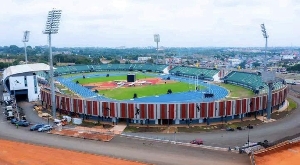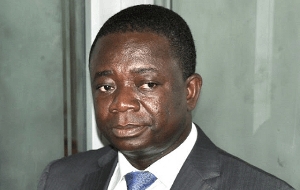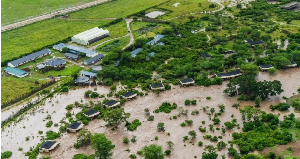- Home - News
- TWI News | TV
- Polls
- Year In Review
- News Archive
- Crime & Punishment
- Politics
- Regional
- Editorial
- Health
- Ghanaians Abroad
- Tabloid
- Africa
- Religion
- Election 2020
- Coronavirus
- News Videos | TV
- Photo Archives
- News Headlines
- Press Release
General News of Wednesday, 24 June 2009
Source: GNA
Government re-births National Climate Change Committee
Accra, June 24, GNA - The National Climate Change Committee (NCCC) was on Wednesday re-inaugurated under the Chairmanship of Mr Edward Osei Nsenkyire, a Former Chief Director of the Ministry of Environment, Science and Technology (MEST).
The Committee has been charged with the responsibility to develop strategies to deal with the current challenges of climate change and also develop a comprehensive National Action Plan to adapt to climate variability and change for the sustained livelihood of Ghanaians. Mr Edward Kofi Omane Boamah, Deputy Minister, MEST, at a brief ceremony, said an assessment carried out by the Environmental Protection Agency (EPA), indicated that Ghana's economy was more in peril than ever before due to climate uncertainties.
As a result he said there was an urgent need to put in place measures to address the challenges posed by climate change. Mr Boamah noted that the National Action Plan with realistic targets would go a long way to address the developmental challenges that climate change posed and reversed the poverty situation of many Ghanaians. He urged the Committee to increase its pace of work and add on to measures, which individual sectors already had in place, but which were not yielding the desired results.
The Deputy Minister also indicated that the re-birth of the Committee would serve as part of Ghana's own preparation to Copenhagen in December 2009 where a global meeting would debate the climate change.
He said Ghana needed to have a consistent position and be adequately prepared to articulate her position as a state party to the UN Framework Convention on Climate Change (UNFCCC). "Such a position must be consistent with the thinking at home as well as have consistency with the aspirations of fellow developing countries in the ongoing negotiations leading to Copenhagen in December 2009," he said.
Mr Boamah said it was expected that the Committee would recommend adaptation actions that adequately responded to the national situation and also psyched the Ghanaian to see the climate change debate as not only environmental and for the elite, but also as a development issue that affected all.
He acknowledged the support and partnership offered by development partners in addressing the challenges posed by climate change to Ghana's development efforts, but said such supports had to be coordinated and harmonised. Mr Boamah said with support from the World Bank, the Ministry aspired to develop a communication strategy to reach out to the broad masses on how best to reduce disaster risks and generally adapt to climate change hazards. "We believe that people need to be continuously reminded of what they have to do under any given situation," he added. He also mention the oil and gas sector as one key sector that would soon change the economic fortunes of the country in the near future, but tasked the committee to establish an energy and climate change nexus to cushion the vulnerability as far as fossil fuels were concerned. Mr Boamah urged the committee to bring on board all stakeholders, especially civil society organisations and major groups, to ensure that policy makers such as Cabinet and Parliament fully understood and participated in the climate debate. Mr Edward Osei Nsenkyire expressed his appreciation to government and pledged to ensure that the Committee's terms of reference, which included initiating a consultative and participatory process for the development of Ghana's policy on climate change were achieved. 24 June 09










